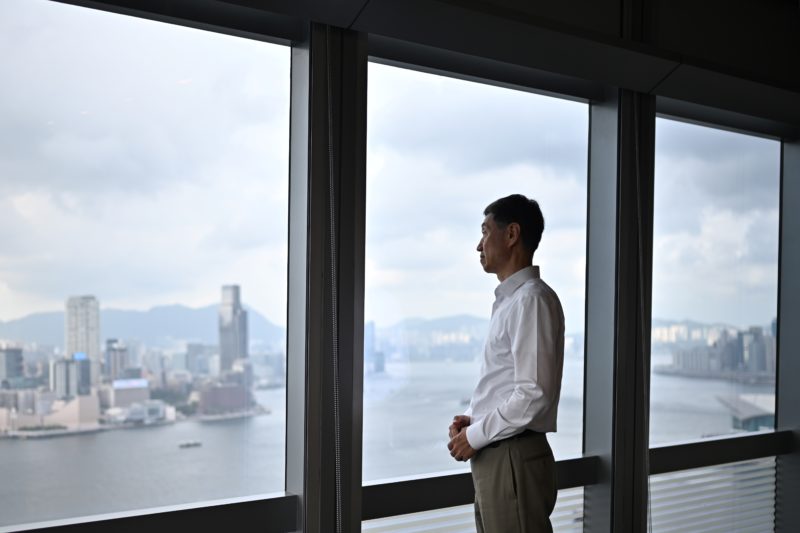Forced labour to high finance: Hong Kong investor’s unlikely journey
At 15, Weijian Shan was sent to the Gobi Desert where he spent six years in backbreaking labour during Mao Zedong’s Cultural Revolution (Anthony WALLACE)
Hong Kong (AFP) – Exiled to the Gobi Desert at the age of 15, Weijian Shan’s days were marked by gnawing hunger and back-breaking forced labour. But his sense of hope was kept alive by an unlikely source — insecticide manuals.
Now one of Asia’s top financiers and the head of Hong Kong-based private equity firm PAG, Shan told AFP that reading — virtually anything he could get his hands on — effectively saved his life, providing “an escape” from the harsh realities of Mao Zedong’s oppressive regime.
“I feel like I have lived 5,000 years,” Shan said, with his recently published memoir, “Out of the Gobi”, recounting a life that mirrors China’s shape-shifting trajectory and offers lessons, he hopes, for young pro-democracy protesters in Hong Kong.
“We were all deprived of a formal education for 10 years,” he said, referring to China’s “Lost Generation” — young men and women who were banished to Inner Mongolia in 1969 and expected to transform an arid landscape into fertile fields.
“I didn’t completely give up,” he said. “I read whatever I could — sometimes insecticide manuals, sometimes dictionaries.”
Yanked out of school in Beijing at the age of 12 during the Cultural Revolution, Shan, like millions of youth, was gripped by revolutionary fervour.
They were promised helicopters, plenty of food and special uniforms, and urged to leave home and “receive re-education” from the peasantry.
The helicopters never materialised, food and water were always in short supply, and the sickles and shovels deployed by Shan and others did little to improve harvests, which fared worse each year.
Shan also baked bricks, cut reeds and dug canals — working for 31 hours straight on one occasion only to discover that his labour was futile because the waterway’s course had been miscalculated.
His rudimentary training as a “barefoot doctor” proved more useful — he saved the life of a seriously ill child and diagnosed his own insomnia as a symptom of malnutrition.
Books were forbidden but Shan devoured everything from chemistry textbooks to medical manuals in secret, and got into trouble for reading Karl Marx’s “Civil War in France” because his company commander thought it was a novel.
– US journey –
His memoir is unflinching about the toll on his peers, including one whose life fell into ruin following his conviction for “counter-revolutionary crimes”.
And they were not the only ones who suffered, he said, pointing to the violence that gripped China in the 1960s and 1970s and destroyed its institutions.
In a particularly horrifying vignette that he insists was not an isolated case, he describes witnessing a group of schoolgirls beating an elderly teacher to death with leather belts for being a “class enemy”.
“We were told repeatedly to ‘take root in the Gobi’, to live there for the rest of our lives, so there was no hope,” he said.
But following Mao’s edict to reopen universities, Shan was allowed to return to Beijing to attend college and study English. He had spent six years in the Gobi.
Then life took a stunning turn — as ties between Beijing and Washington eased, Shan became one of the first students sent by Communist China to the United States.
He went on to finish a doctorate, studying economics under future Federal Reserve chief Janet Yellen, who in a foreword to his memoir, recounts her amazement when she realised that Shan had taught himself “all the math he knew… by candlelight”.
– ‘Open the door’ –
Now 65, Shan believes his life holds lessons for young people, particularly in his adopted home of Hong Kong, where fears about Beijing’s increasing control over the city have prompted huge protests and violent clashes with police.
“When I went to the US, China’s door had opened just a crack… but (as years passed) it opened further,” he said.
“Once the door opens, it opens wider and wider,” he said, adding that the all-or-nothing approach adopted by Hong Kongers demanding universal suffrage risked closing off any possibility of compromise and change.
“Why not start with something… so the door is opened?”
Having lived through a cataclysmic era in China, he said, “what is important for my generation is not to have history repeated”.
With a Chinese translation underway, people in the mainland will soon be able to read his story, possibly with some portions censored to manage “sensitivities”, he said.
But some enterprising Chinese readers have already got their hands on pirated editions, he said.
He added: “If people want to read my book — pirated or not — I don’t mind. If you don’t take lessons from the past, there is a risk of repeating history.”
Disclaimer: Validity of the above story is for 7 Days from original date of publishing. Source: AFP.


